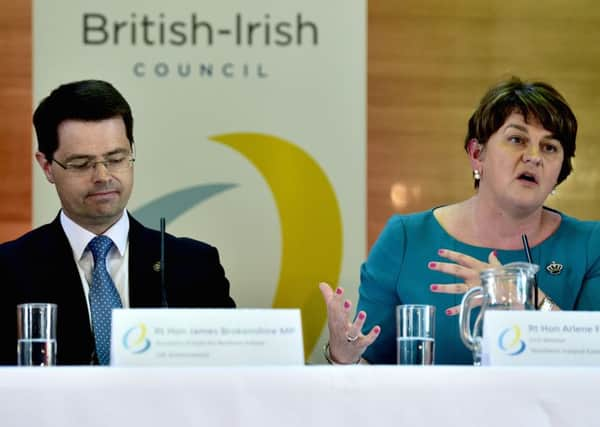Time to accept EU result, UUP tells McGuinness


In a move which again makes clear that the UUP will not go along with Sinn Fein and SDLP claims that because a majority in Northern Ireland voted Remain then the Province should not leave the EU, the party last night said that there is now a need to focus on a “post-Brexit plan”.
The statement came after Mr McGuinness used an emergency British-Irish Council meeting in Cardiff to claim that leaving the EU would be “economically, socially and politically disastrous for the North of Ireland”.
Advertisement
Hide AdAdvertisement
Hide AdMr McGuinness said that leaving the EU would “potentially” cost Northern Ireland “tens of billions” over the coming decade and again said that Northern Ireland should be able to stay in the EU after the UK leaves.
But UUP MLA Philip Smithy said: “Martin McGuinness needs to get real and stop chasing rainbows. There is not going to be a border poll.
I didn’t hear him object when a UK-wide referendum was called so he can’t now start complaining about it after the result.
“I didn’t like the outcome, but the people have spoken and the result is the result. It’s time for Martin McGuinness to move on. Calls for a border poll are an utter distraction.
Advertisement
Hide AdAdvertisement
Hide Ad“He and his Executive colleagues should be concentrating on producing a plan for farmers, community groups and local businesses who have been plunged into an era of uncertainty while the Executive prevaricates.”
Meanwhile, the British and Irish governments yesterday agreed that a post-Brexit “hard” border must not be allowed to happen.
Enda Kenny said it was vital there would not be a return to the days of “checkpoints, towers and customs”.
He said: “There are modern ways of not having hard borders. I can tell you that hard borders would not be accepted in the south or the north.
Advertisement
Hide AdAdvertisement
Hide Ad“The best possible outcome for everyone is a UK that’s prosperous and has the closest possible links with the European Union. For us in Ireland, that means access to the single market.
“And it’s been made perfectly clear by the EU council that if that is to happen, then the respect has to be there for the freedom of (movement of) people. We have difficulties but I expect us to retain the Common Travel Area. It’s a fundamental part of who we are.”
Leaders and ministers from eight British-Irish Council members - the UK and Irish governments, devolved administrations of Northern Ireland, Scotland and Wales and the governments of Jersey, Guernsey and the Isle of Man - met in the Welsh government’s Cathays Park headquarters yesterday.
Welsh Labour First Minister Carwyn Jones said he called an extraordinary meeting of the council at short notice because of the “tumultuous” political landscape after the EU referendum.
Advertisement
Hide AdAdvertisement
Hide AdHe said: “It is more important than ever to maintain the strength of this relationship and work together to map out a successful way forward.”
Mr McGuinness said he had “no faith” in a Tory Government to replace any money lost by being out of the European Union.
First Minister Arlene Foster argued that the establishment of checkpoints in the 1970s had been due to terrorist threats - but said she believed a Common Travel Area would still be possible even with the UK out of the EU.
She said: “It’s not only vital to Northern Ireland, the Republic of Ireland, but also (other home nations such as) Wales too.”
Advertisement
Hide AdAdvertisement
Hide AdThe council’s debate over the Common Travel Area comes after French President Francois Hollande said on Thursday that he is prepared to recognise Ireland’s “special” circumstances.
Wales’ First Minister said Article 50 must be triggered before next summer - or there would be a real a risk Leave voters would think the referendum result was was being ignored.
However, the former barrister said there were still a lot of issues to resolve first. He added: “There are some issues - like farming or fisheries - where in policy terms there is no UK. It’s all entirely devolved.
“So any devolution in those fields, the UK Government can’t negotiate or agree on behalf of the devolved governments.”